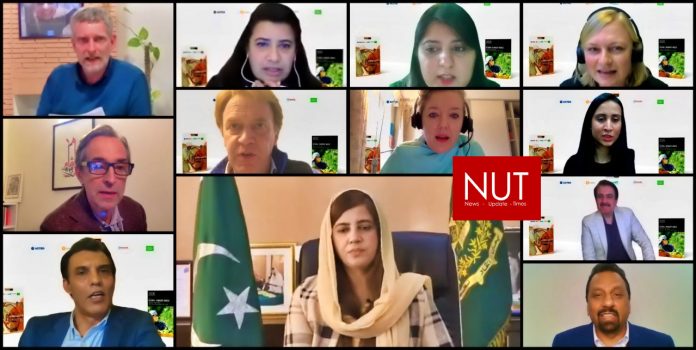Lahore (Muhammad Yasir) Pakistan ranks 88th out of 107 countries in the Global Hunger Index while food security and nutrition crisis is expected to worsen in the wake of the COVID-19 pandemic because country has a serious hunger level. Among countries in the developing world, Pakistan faces one of the most severe crises of malnutrition, which is the fundamental cause of child morbidity and mortality.
These are the finding of the “2020 Global Hunger Index & Strategy for Stakeholders’ Engagement on Food and Nutrition Security 2021– 2025 report launched by Alliance 2015 — a strategic network of leading eight European non-government and non-profit organizations engaged in humanitarian and development actions in Pakistan and the world in Islamabad.
Addressing the webinar, State Minister of State for Climate Change Zartaj Gul said that the current ranking of Pakistan with regard to hunger index is not encouraging but it is the vision of Prime Minister Imran Khan to bring people out of poverty. “Food security has direct relationship with climate change. The government has introduced climate smart technology in South Punjab and Sindh to improve agricultural production,” Zartag Gul said.
Dr. Abid Qayyum Suleri, Executive Director, Sustainable Development Policy Institute, said that the report highlights that the worsening food and nutrition security situation retarded human and economic development and carried the risk of jeopardizing national security if it was not tackled well by government, private sector, civil society, media, public, communities, and academia and research institutions, the report pointed out. “The time to act is NOW, individually, and collectively,” the he warned, and added that the report also identifies key stakeholders and roles they can play in averting this crisis besides laying out stakeholders’ engagement goals and objectives in the next five years.
H.E. Mr. Julien Harneis, UN Resident Coordinator and Humanitarian Coordinator in Pakistan talked about the food security, nutrition and agricultural issues in Pakistan and said, these are the structural issues, the highest malnutrition has been seen in Sindh and Balochistan. While talking at the webinar, it is advised to engage the scientists and government officials to jointly see how we can contribute to improve these areas of malnutrition, hunger and food security and agriculture to diversify the economies. The technologies can be introduced in the most affected areas to enhance the economic impact of the societies, he added.
The COVID-19 pandemic has further aggravated the food and nutrition security situation in Pakistan. Travel restrictions and limitations on the movement of essential goods including food and agricultural inputs, protracted loss of income, and rise in prices have already negatively impacted millions of Pakistanis. The IMF has predicted a sharp reversal in the declining poverty rates, with 40% of the population below the poverty line after the spread of COVID-19. Moreover, 17 million children under the age of five are missing routine vaccinations, leaving them unprotected and more vulnerable to health risks posed by COVID-19 outbreak’.
He said that the report highlights that globally, far too many individuals are suffering from hunger: nearly 690 million people are undernourished; 144 million children suffer from stunting, a sign of chronic under nutrition; 47 million children suffer from wasting, a sign of acute under nutrition; and in 2018, 5.3 million children died before their fifth birthdays, in many cases as a result of under nutrition.
To better respond to, and indeed to prevent, the report highlight that complex emergency, multilateral institutions, governments, communities, and individuals should use the lessons learned during the COVID-19 pandemic and other crises to build safe, resilient food systems. They should review food, health, and economic systems through a One Health lens to chart a path to environmental recovery by investing in sustainable food production, distribution, and consumption.
An alarming 37% of the population in Pakistan is classified as food insecure; meaning that they do not “have physical and economic access to sufficient, safe and nutritious food that meets their dietary needs and food preference for an active and healthy life,” according to the Food and Agriculture Organization.
The participants of the webinar included H.E Julien Harneis, UN Resident and Humanitarian Coordinator, Pakistan, Bernard Jasper Faijer, Head of Mission, ECHO Pakistan, Chris Kaye, Country Director, UN-WFP, Shahid Fazal, Nutrition and Food Policy/Strategy Consultant, Dr. Irshad Danish, Advocacy Advisor, Nutrition International, SUN-CSA, Aisha Jamshed, WHH Country Director, Farhan Ahmed Khan, Cesvi Head of Mission, Miriam Wiemers, Expert, Global Hunger Index and Member WHH Global Policy and Advocacy Team, Dr. Arjumand Nizami, Country Director, Helvetas, Dr. Shadab Fariduddin, Policy Analyst/Consultant, Mr. Muhammad Nasir, Manager, SUN Business and others.







